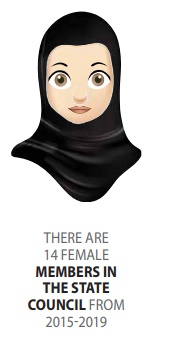

MUSCAT, July 16 - Omani women accounted for nine per cent of positions in the national parliaments in 2017, said the National Centre for Statistics and Information (NCSI). The data on women’s participation in national parliaments around the world comes from ‘PARLINE’ database compiled by Inter-Parliamentary Union (IPU). The database contains information on the structure and working methods of 270 parliamentary chambers in all the 193 countries where a national legislature exists (Oman included). Female members of parliament are present in both Majlis Ash’shura and State Council.
Members of Upper House, (State Council), are in fact directly appointed by His Majesty Sultan Qaboos for a term of four years.
There are 14 female members in the State Council from 2015-2019: Dr Suad al Lawati, Dr Muna al Bahrani, Dr Nada al Jamali, Eng Rahma al Musharfi, Dr Raya al Mandhari, Eng Nashea al Kharousi, Dr Wafa al Harrasi, Dr Muna al Saadon, Dr Badriya al Shihi, Dr Zuhoor al Khanjari, Dr Aisha al Wishahi, Dr Sabah al Bahlani, Dr Maryam al Zadjali and Dr Lujaina al Zaabi.
In Majlis Ash’shura, Nemah al Busaidy was re-elected to represent Wilayat Al Seeb for another four years.
She was also the only woman elected to the previous council.
Although Oman became the first Gulf state in 1994 to grant women the right to vote and contest for public office, the number of female candidates in the Majlis Ash’shura elections slid over the years from 27 in 1997 to 15 in 2004. Only two women were elected in 2004. None of the 21 female candidates succeeded in the 2007 elections. Only one woman, Naama al Busaidiyah, succeeded in winning a seat in the 84-member council in the last election in 2011, despite the fact that the number of female candidates had increased (77 out of 1,000 candidates).
As part of target No 5 in ‘Towards Achieving Sustainable Development Goals 2030’, Arab Gulf Programme for Development — AFFUND, has been achieving gender equality and empowering all women and girls in order to maintain comprehensive/effective participation of women in all fields, and giving them equal chances in political experiences.
Empowering women is one of the most crucial concerns of the Millennium Development Goals of the United Nations.
One of the national priorities and goals of the Human Resource Development Strategic Plan outlined by the social sector of the Ministry of Social Development in Sultanate of Oman includes the vision of the development and upgrading the status of women and facilitating their integration into the total social development.
Mai al Abria
Oman Observer is now on the WhatsApp channel. Click here



